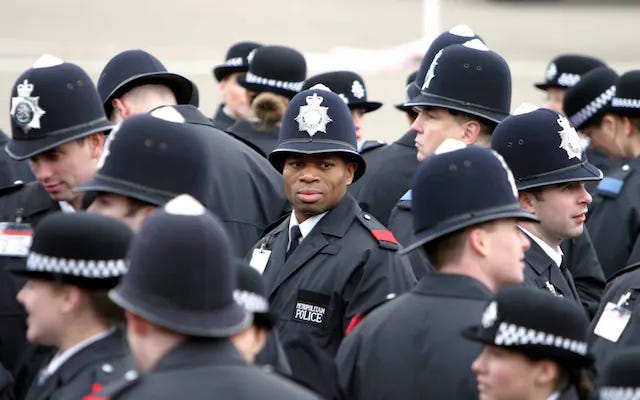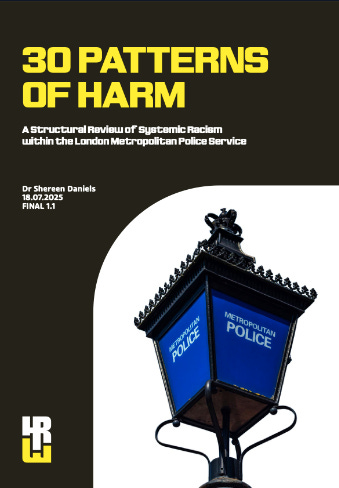Met Police finally publishes buried racism report - weeks after our editor revealed it was being withheld
Today’s publication comes after selected media were contacted by the Met Police with a notice of the force’s intention to publish the 126-page document

The Metropolitan Police Service has finally published its 30 Patterns of Harm report, weeks after our founder revealed that the force had been sitting on the document for months despite repeated calls for transparency.
The independent review, authored by Dr Shereen Daniels under her HR Rewired firm, was commissioned by the Met to examine how anti-Black racism, specifically, has shaped the institution’s culture, leadership and relationship with Black communities.
The report concludes that bias, racial stereotyping and inequity were woven through the force’s recruitment, promotion and grievance processes.
Conducted between May and July 2025, the review found that the Met’s performance and promotion systems rewarded familiarity over fairness, favouring those who mirrored its culture. Black staff were given coded feedback such as “not quite ready” or “be a bit friendlier,” while ambition or challenge was reframed as arrogance.
Those who spoke out against racism were penalised, with misconduct routes weaponised against dissenters. The report warns that Black presence is tolerated — but Black dissent is punished. Power remains overwhelmingly white, even as Black staff are asked to “bridge” the Met’s anti-racism work, and colourism and misogynoir persist in how staff are perceived and judged.
A report kept from public view
In October, Black Current News reported exclusively that the Met had received Dr Shereen Daniels’ inquiry report but had not released it, raising questions about transparency and accountability at a time when the force claims to be pursuing cultural reform under Commissioner Sir Mark Rowley.
Today’s publication follows the Met Police contacting selected media outlets with a notice of its intention to release the 126-page document and its companion guide, accompanied by a statement from the Commissioner acknowledging that “further systemic, structural, cultural change is needed.”
Black Current News and journalist Nadine White were not among those initially notified by the Met that the report would be published.
‘Systemic racism is not perception’
Dr Daniels’ analysis traces nearly fifty years of evidence to show how institutional structures continue to reproduce racial inequity.
“Anti-Blackness is the clearest indicator of organisational dysfunction,” she writes. “The same systems that sustain racial harm against Black people also enable other forms of harm”.
Dr Daniels describes the Met’s culture as one that “protects itself from consequence,” calling on leaders to build “the discipline to face what the report has revealed and act on its findings in a way that protects the public rather than the institution”.
The report was welcomed by Doreen Lawrence, the mother of Stephen Lawrence, whose family was subjected to spying by the Met Police and corrupt officers’ investigation following Stephen’s 1993 murder by racists.
However, Ms Doreen said it contained “nothing that I did not already know”.
“Racism was the reason why Stephen was killed and racism was the reason why the police have failed to find all of his killers,” she said.
“Racism must be acknowledged, accepted and confronted in the Met.
“In the three decades since my son’s murder, there has never been an honest acceptance of racism and how it has affected how our communities are treated.
“The police must stop telling us that change is coming whilst we continue to suffer. That change must take place now”.
Met promises reflection, critics demand urgency
The Met says it “welcomes the report in full” and intends to use it to shape the next phase of its London Race Action Plan, working with partners across education, housing and health to address wider inequalities.
However, critics say the force must move beyond reflection toward measurable reform.
Abimbola Johnson, Chair of the Independent Scrutiny and Oversight Board, told Black Current News: “The Met’s leadership has had Dr Shereen Daniels’ report since July but only shared it two days ago with Black officers and staff; the London and National Race Action Plan Teams; and independent scrutineers. That delay matters.
“The report should by now have been guiding deep conversations with Black officers and staff and external stakeholders about how racism persists within the organisation. Much of its observations have been highlighted for years by groups such as the Met Black Police Association and civil society organisations.

“The ISOB will be focusing our efforts on ensuring that those conversations take place now that the report is in the public domain.
“Dr Daniels’ work can be a catalyst for transformation, but only if the Met engages with it honestly and changes the habits that keep racial harm in place. The government, MOPAC media and external organisations must also continue to push and hold the Met accountable. Leaving it to deliver this work on its own will be a huge mistake.”
Many within London’s Black communities fear the report could join a long list of inquiries whose recommendations have gone unfulfilled.
A test of transparency
For Black Current News, today’s publication marks a critical moment in the public’s right to know.
The force’s decision to finally publish 30 Patterns of Harm demonstrates the continuing power of scrutiny and the necessity of journalism in ensuring that promises of anti-racism are met with transparency and accountability.
Read the full report: Met Police – 30 Patterns of Harm



